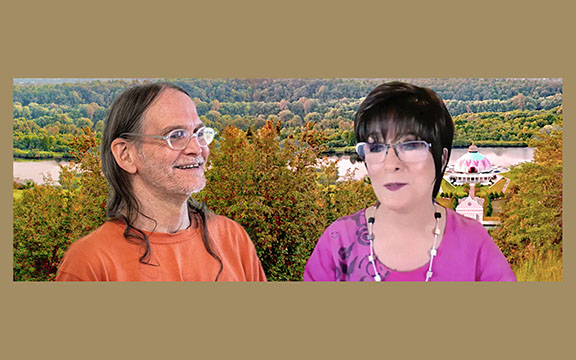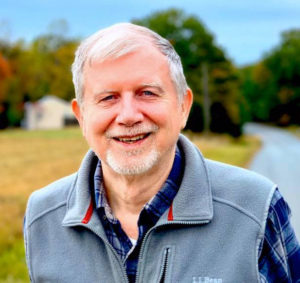
(Photo credit: Matthew Bennett)
Let’s face it, we live in a busy world. This just may be the reason that podcasts have become so popular—not only are they convenient, it’s easy to multitask while we listen. I’ve been listening to a wonderful podcast lately: “Two Old Fogey Yogis.” I’ve been enjoying it a lot and was a bit disappointed to hear they will be wrapping up their first season soon and while they don’t have plans at present for a second season, they may yet be convinced to do just that.
I’m not a big podcast listener—at first, I was rather intrigued by the name: “Two Old Fogey Yogis.” I’m a yogi and well, I’m pretty old or so the calendar tells me. Perhaps this podcast would be something I could really relate to? I mean, I have seen videos of young yogis twisting into positions I can only reminisce about, but what might yogis around my age (70+) be talking about? And, would anyone be interested?
The title of the podcast is catchy and hard to forget, yet I’m not a fan of ageism and wondered if it might be a bit off-putting to some? I am sensitive to how, traditionally, our American culture has celebrated youth, beauty, and current accomplishments, while its older members are often “put out to pasture.” I looked up “fogies” in the dictionary and found terms such as stiffness, rigidity, and dullness, but Yoga practices—diligently applied—unfailingly foster physical flexibility, youthfulness in both appearance and attitude, enhanced energy, and mental clarity. I know these two these two yogi podcasters, and they amply personify such qualities.
I’m mostly retired now and I feel content with the contributions I have made. Yet, as my involvement in work and the world has diminished, thanks to Yoga my inner life has only expanded and become an increasing source of joy and renewal. It seems that is the two yogis’ experience as well, so I would think “Two Maturing Know-ey Yogis” might have been a more fitting title for their podcast. Yes, I know, that’s kinda awkward, and not as catchy, plus I’m sure their humility would have precluded its use, recognizing that, after all, until fully enlightened, what do we really know? Still, that title would seem more apt, in my humble opinion.
Soon enough, however, I realized what any listener will quickly recognize: the title reflects some good-humored self-deprecation by two senior citizen yogis. Both have practiced Yoga virtually all their adult lives, and continue to do so. As I tuned into the introductory episode of the series, I was thinking it might offer hints of how to adapt one’s Yoga posture practice for the “golden years,” which could be useful, though not my top interest. But I soon discovered that this podcast was not mainly about asanas/postures. The podcasters discussed—not in a judgy, but more informational way—how the exclusive practice of asanas, leaving out all else associated with the classical Yoga traditions, could be called “postural Yoga.” Their focus is much broader than that.
You may have noticed that I capitalize “Yoga.” Why? Because for me, it’s a sign of respect for a classical tradition that is more of a philosophy, lifestyle, and spiritual path than just a “postural” practice. And that’s what I encountered right away listening to my fellow old fogey yogis: a deep dive into the rich and multifaceted tradition of classical Yoga. That really appealed to me. That, plus the humorous and interesting way these two yogis really get into some deep exploration and self-revelatory discussions on a range of subjects—from their own personal Yoga journeys, to their struggles and strategies to maintain steady Yoga practices, to demystifying enlightenment, and even to how Yoga can help our interpersonal relationships and communication. Their reflections on the wisdom of the traditional, sacred Yoga texts such as the Bhagavad Gita and Yoga Sutras of Patanjali, and their own real life experiences applying Yoga, helped me remember what can be the positive side of getting older: the wisdom gleaned over time.
Even in my younger days, Yoga was never just one thing for me. It’s not just a practice I try to do daily (less postures now, more Yoga Nidra, pranayama, meditation) but it’s also living a life in alignment with the principles and precepts of Yoga (yama and niyama). It’s about truly living Yoga—the cliched but true “taking Yoga off the mat” and into every moment of my life. Isn’t that the point of any meaningful spiritual practice? For me, yes! And, the two yogis reminded me of what drew me to Yoga in the first place and what has kept me sticking to the practices and to a lifestyle that includes being vegetarian, valuing inner peace, treating myself and others with compassion, recognizing we are all one in spirit, and so on. Also, in the process of listening to the wisdom of these two yogis, I picked up some very helpful tips for my Hatha and meditation practice, inspiration for better understanding foundational Yoga literature, and I’m grateful to them for helping this senior yogi reflect on his own life, spiritual journey, and the wisdom uncovered in the process.

(Photo: Swami Asokananda and Rev. Prem, the “Two Old Fogey Yogis.
Oh, and I should mention that the “Two Old Fogey Yogis” of this podcast are Swami Asokananda and Rev. Prem, two of the most senior members of Integral Yoga (an organization of which I am a member and I also reside in Yogaville). One of the oldest Yoga organizations in America, Integral Yoga was founded in 1966 by Swami Satchidananda, affectionately referred to as the “Woodstock Guru,” because he was flown in by helicopter (due to the Festival traffic jam) at the last minute to try and set a peaceful vibe at what was quickly becoming a unmanageable crowd swelling to “half a million strong” (as the Joni Mitchell song goes!)
Basically, I experienced these podcasts as a quick, easy, and entertaining way to learn a lot from two people who have had a rare, precious “inside Yoga” experience. Rev. Prem served as Swami Satchidananda’s personal assistant for 24 years, and has also for 17 years been in charge of Integral Yoga’s multimedia outreach, overseeing production of numerous documentaries, books, CDs, DVDs, online materials, and more. During that time, among many other things, while doubtlessly employing her Ph.D. in psychology, she has proved quite skillful at conducting informative, penetrating interviews with a wide range of prominent and accomplished people for Integral Yoga Magazine, which she has edited for over 17 years. Swami Asokananda, in addition to having held chief executive responsibilities at different times for various of Integral Yoga’s largest centers, he has been one of Integral Yoga’s foremost Yoga teaching and teacher training representatives worldwide for many years, employing his decades of close guidance from Swami Satchidananda.
The podcast episodes include inspiring discussions of the formal practices of Swami Asokananda. For example, he leads a very disciplined lifestyle, eating only one meal a day and meditating unfailingly three times every day no matter how otherwise busy he may be—something he’s been doing now for 50 years! There is also much discussion concerning his Hatha Yoga practice, which is also very disciplined, regular, and advanced. He shares the way in which his practice has evolved over the decades, leading him deeper and deeper within. Rev. Prem also shares from her own experiences and lessons learned in her many and varied years of seva, as well as her deep dive into the various moksha traditions and their sacred texts.
Leaving the catchy, hard to forget title of the podcast aside, these two yogis amply personify the qualities of Yoga while neither abandon their own personalities in the process! Rev. Prem seems more of an “extroverted-introvert,” while the Swami seems more of a “dyed in the wool” introvert, but opposites attract and they find their yin-yang balance quite naturally. I’m enjoying the entertaining way they talk and I’m struck by the really transparent way these highly influential, totally dedicated, but very different yogis share so candidly about their lives—discussing what inspires them, what they have personally struggled with, and offering spiritual suggestions and insights meant to be useful and instructive to their listeners.
As I reflect on my own life as an “okay boomer,” I recognize just how quickly time has flown. I and my sixties generation sisters and brothers may not be as physically spry as we once were, yet as the days somehow turned into decades, a major observable effect of the inexorable process of Yoga for me has been in an even more meaningful area: a gentle mellowing, a rounding, and smoothing of sharper edges.
I hope the “Two Old Fogey Yogis” might return for a second season of their podcast. Perhaps, as a gurubhai of mine recently suggested, they could come back as: Older, Fogeyer & Yogier. I look forward to that.
About the Author:
 Hari Barker was born and raised in Virginia, where he continues to live easefully and peacefully in the Shenandoah Valley’s foothills of the Blue Ridge Mountains at Satchidananda Ashram–Yogaville. He received a B.S. in economics from Virginia Commonwealth University and Northwestern’s National Graduate Trust School. He worked as a bank examiner with the Federal Reserve for over 17 prior to becoming a Yoga teacher. Hari served 20 years as Business Manager of Integral Yoga Publications and 15+ years as Financial Vice-president of Satchidananda Ashram–Yogaville. He also served as board chair for the Yogaville Federal Credit Union for over 36 years.
Hari Barker was born and raised in Virginia, where he continues to live easefully and peacefully in the Shenandoah Valley’s foothills of the Blue Ridge Mountains at Satchidananda Ashram–Yogaville. He received a B.S. in economics from Virginia Commonwealth University and Northwestern’s National Graduate Trust School. He worked as a bank examiner with the Federal Reserve for over 17 prior to becoming a Yoga teacher. Hari served 20 years as Business Manager of Integral Yoga Publications and 15+ years as Financial Vice-president of Satchidananda Ashram–Yogaville. He also served as board chair for the Yogaville Federal Credit Union for over 36 years.
(This article originally appeared in Elephant Journal)

